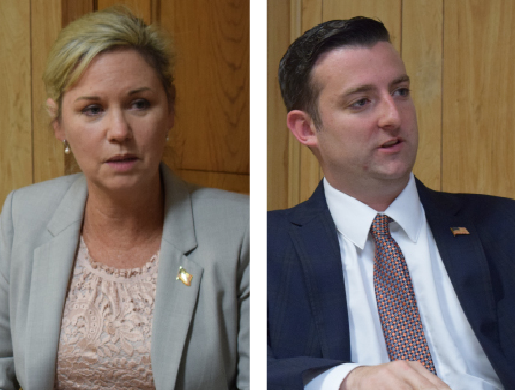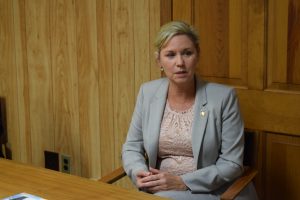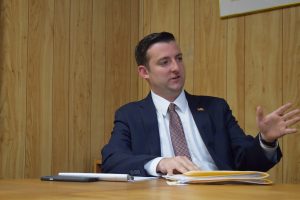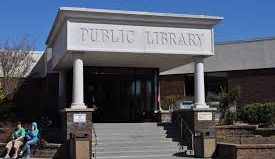Incumbent Sarah Anker heads against newcomer Brendan Sweeney

Running on the Republican ticket for District 6 of the Suffolk County Legislature, Brendan Sweeney, of Shoreham, is currently a citizens advocate in the office of Supervisor Ed Romaine (R), Town of Brookhaven. His opponent, incumbent Legislator Sarah Anker (D-Mount Sinai).
Before serving in the Legislature, Anker had been energy director for the Town of Brookhaven, where she developed solar programs and promoted clean energy and green homes technologies. She had also served on the Mount Sinai school board, raising three children in the district.
Anker graduated from Pasco High School in Dade City, Florida, and received a bachelor’s degree in liberal arts in 1986 from St. Leo University in Dade City, Florida. She took graphic design courses at New York Institute of Technology in Old Westbury.
She first ran for county legislator a little over 10 years ago. The 2021 election is the last term she can run for and she said she can explain her reelection in three words: “To help people.”
Sweeney, 28, previously worked in the Brookhaven Town Building Department, the town Department of General Services and the town Law Department. In these roles, he worked on town issues including abandoned houses and building issues. He worked on Freedom of Information Law compliance in the town building and planning departments. He also worked for county Comptroller John Kennedy Jr. (R-Nesconset) when Kennedy was a legislator, and in the county Department of Audit and Control.
Sweeney graduated from St. Anthony’s High School and received a bachelor’s degree in history in 2014 from the University of Florida. He said he is currently enrolled at Touro Law School in Central Islip.
“It has always been in my in my blood to want to help people,” he said.
COVID-19 recovery
Anker has been working for the county throughout the whole COVID-19 pandemic, using her platform to help connect people with vaccines and continues to educate her constituents on the matter.
“Hopefully it’ll get better and hopefully we will have a better understanding,” she said. “What happens is that if we don’t know what’s around the corner, there’s nervousness, there’s tension and there’s anxiety — that’s what we’ve all been experiencing the past almost-two years.”
Anker said that throughout the pandemic, she worked constantly with the state.
“I noticed, though, we need to do more on a county level to address the process to get a vaccine,” she said.
When vaccines became available, she said that she, as chair of the county Seniors & Human Services committee, helped to get senior citizens their vaccines because she knew they were feeling left out.
After calling the state, she said she helped set up vaccination pods at local fire departments, along with facilitating communication between doctors with credible information.
“It was frustrating,” she said, “but I have a website that is being put together to help bring critical medical information to medical providers.”
Anker believes that trust needs to be brought back into society.
“I think the political divide has hampered that — and I’ll say on both sides to a great extent because we have more in common than we have different,” she said. “We need to figure out how we can come back to that foundation because our adversaries are just waiting.”
Sweeney believed that the county did “a good job overall” in how it handled the coronavirus crisis.
“To be given the hand that they were dealt with, I have to give credit where credit is due,” he said.
He, however, believes that we need to adjust to a “newer normal.”
Sweeney said it’s important to encourage people to get their vaccinations against the virus, but ultimately believes it should be a choice.
“My attitude is we have to have the government going to people and telling them the importance of it,” he said. “But the problem right now, ever since Watergate, is there’s been a distrust in government.”
Sweeney believes that information should be going straight to trusted medical providers to work with their patients to alleviate concerns or find a way to cease apprehensions.
Small business

While the COVID-19 pandemic impacted the daily lives of people around the world, local small businesses are still struggling. Anker said that to help business owners, she proposed legislation to create a small business website to make it easier for those struggling.
The site includes resources for PPP, grant applications and other entities to help people navigate through the constant changes associated with COVID. She hopes that the site can also provide ways to help business owners find employees willing to work.
“There’s so many people struggling,” Anker said. “You can go down part of the whole street here and find ‘help wanted’ signs.”
Sweeney, who helped on the Brookhaven level with the coronavirus task force, had local chambers of commerce meet together to suggest the biggest issues in town. A big problem, however, was the restrictions coming in from the state level.
“That limited, even the suggestions the businesses came to us with, for we were limited in what we could actually implement, since our regulations that we had power over were taken away from us,” he said.
But Anker said that the two share a similar perspective — the county did a good job under the circumstances and worked along other levels of government to get things done.
“I can see where there could have been improvements, and as we continue to go through this, I’m hoping that I can help tweak it,” she said. “I’m in a place at this point where I can make suggestions, I can propose legislation, I can create a task force to get all these amazing minds together to try to solve some of these problems. But, you know, we are all in this and we’re all trying to get through it.”
One project Anker helped with was working alongside the county Department of Labor at the One-Stop Employment Center.
Before the pandemic, she coordinated a field trip for Rocky Point High School seniors to visit the center. She insists that young people heading out of high school and into college need to be up to date on new technology for the future jobs that will be available.
Sweeney agreed, but noted that colleges, like county-funded Suffolk County Community College, should be given more money.
“The county is not paying its fair share right now, nor is the state, so the state’s at fault, too,” he said. “The original formula when it was decided, when it was formed, was 33% county, 33% state and basically 33% paid for by the taxpayer going to the college. But right now, it’s more like 50% for the taxpayer.”
He also believes encouraging students that college is not the only choice out there is important.
“We need to encourage people that any option is out there, you don’t have to just immediately go to the white-collar option,” he said. “Some of these blue-collar jobs, they may not look glamorous and the work you’re doing, but the pay you’re getting because they’re in such demand will entice them.”
Water quality
Anker became involved with local environmental issues nearly 20 years ago, and now with her current role as legislator, she said she is in a place where she can vote on land preservation, clean up toxic sites, enforce illegal dumping and more.
As of late, Anker is working toward dredging, which was finished in Mount Sinai Harbor earlier this year.
“This is something I’m going to focus a lot more on in the upcoming weeks,” she said.
“I’m also working to try to figure out a way to stop chemicals, medication — there’s all kind of stuff coming out in our sewers, and some of those sewer lines go right out into our oceans,” Anker added. “And to me, that’s unacceptable.”
Sweeney said he would focus on adding more sewers to the county.
“We should put sewers where everybody that desires sewers wants them,” he said. “That’s an ambitious goal, and it’s unlikely to happen in the near future, but that’s what we’re working toward.”

By adding more sewers to areas that need it, it could eventually help the aquifer where Long Islanders get their water. Sweeney added that he hopes to see the federal infrastructure bill pass soon, so more funds could go toward improving local water quality.
Both Anker and Sweeney agree that infrastructure in their district needs to improve.
“We’ve had a lot of flooding in Rocky Point,” Sweeney said. “Driving along William Floyd [Parkway], there are so many potholes.”
While funding comes from different levels of government depending on the roads and territories, he said that on the county level, two things should be done: preventing stormwater harm and sewering issues.
Anker said, however, that she truly feels that the town and county work together well when it comes to joining together to better the areas they share.
“We focus on a lot of issues, and we were very productive and getting things done,” she said. “We focus a lot on quality-of-life projects together.”
Downtowns
Anker was instrumental in the development of the North Shore Rail Trail connecting several different communities with a brand-new park, walking and biking trail.
“We’re all one big community,” she said. “So, I think it’s important to support the local civic associations that work together, support the local historical societies that are keeping our legacy alive for that.”
She added that a high priority of the Legislature is to provide more open space.
Sweeney agreed, and said that he believes communities in the district appreciate and like to visit downtowns, but aren’t necessarily looking for one in their backyard.
“For me, I look at it not that we don’t want downtowns because we do have Rocky Point,” he said. “I think some of our residents would prefer that true suburban area. Our district is where you want to start your family. You want to move into a house, you want to occasionally go out for dinner and drinks with your friends or your spouse, and you go into the downtown area and then you go back home — but you don’t want that constant hustle and bustle, either.”
Affordable housing
Throughout Anker’s career in local government, she has helped to implement legislation that requires developers to provide affordable housing, or workforce housing. While at first unwelcomed by people within her district, she said they are now starting to see a need for the kids to have a place to live.
“It’s becoming much more acceptable,” she said, adding that Mount Sinai has started to see several 55-and-over communities pop up for empty nesters.
Sweeney, a young person himself who has just purchased a home, said that the county should help with making living on Long Island more affordable.
“One of the first things that I would do from the county aspect would be to start trying to find areas of the budget that we can start cutting, start reducing so that we can lower our expenditure on the average taxpayer,” he said. “That little bit can be just enough of what you need to be able to make the difference between staying in your apartment that you’re in right now and purchasing a nice, lovely new home in Coram, Middle Island or Mount Sinai.”






